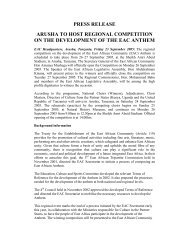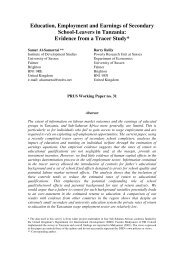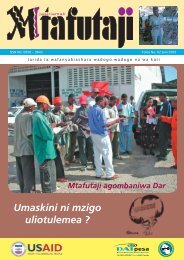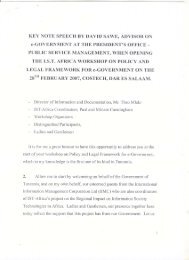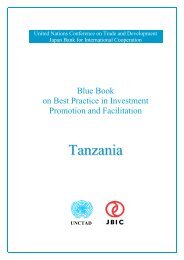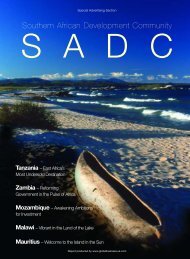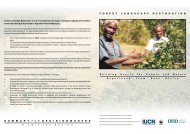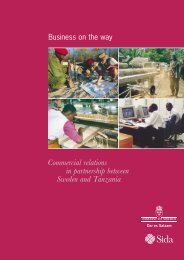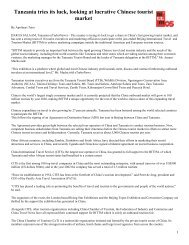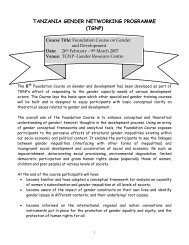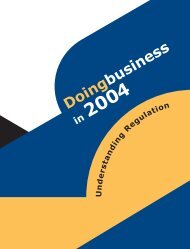The Girl-Child and Government Service Provision.pdf - Tanzania ...
The Girl-Child and Government Service Provision.pdf - Tanzania ...
The Girl-Child and Government Service Provision.pdf - Tanzania ...
- No tags were found...
Create successful ePaper yourself
Turn your PDF publications into a flip-book with our unique Google optimized e-Paper software.
Case story 3Mercy John, a 14-year-old girl, lives in the Samuye ADP area. At the moment she is at st<strong>and</strong>ard VII <strong>and</strong>expected to sit for final examinations in September this year. Describing the different tasks she has to dobefore going to school <strong>and</strong> after coming home from school, she said:“Always I must make sure that I wake up before 6 a.m. <strong>The</strong> first thing I do in the morning before going toschool is to fetch water. <strong>The</strong>n I prepare porridge for my younger siblings as well as ensuring that all dirtykitchen utensils are cleaned before I leave for school. In the evening, after getting back from school, again Ihave to go <strong>and</strong> collect water. It takes up to two hours to collect water from the one source available forwater in our village. It usually takes longer because many village members [especially women <strong>and</strong> girls] go forwater at evening hours.Another activity that will occupy my evening is preparing the family evening meal. While I am cooking, Ialso wash dishes <strong>and</strong> clean the surrounding home environment. In the evenings I also must take care of mysiblings, especially bathe them <strong>and</strong> on some occasions change their dirty clothes. I usually finish my tasks ataround 9 p.m., very tired <strong>and</strong> ready for sleeping. Because of domestic tasks I usually don’t have time to studyat home. After all, my parents usually say they don’t have money to buy kerosene to put into the lamps sothat I can study at night. On Saturdays my main activity is to go into the distant bushes (together with myfriends) to find <strong>and</strong> collect firewood. It usually takes most of my day. We leave at 7 a.m. <strong>and</strong> return home ataround 1 p.m. or 2 p.m. During farming seasons, together with my brothers <strong>and</strong> younger sisters, we go to thefarm before going to school”.<strong>Girl</strong>s are the future women <strong>and</strong> mothers in every society.<strong>The</strong> activities assigned to girls were also attributed to thefact that a society must prepare its children for their futurelives. Since it is women’s role to carry out most of thedomestic work <strong>and</strong> tend their family, it is considered logicalfor girls to do similar work regardless of their ages <strong>and</strong>educational needs. Such gender imbalances in the societyat large have negative <strong>and</strong> damaging effects on the wellbeing<strong>and</strong> welfare of a girl-child.Access to health servicesThis study did not find any discrimination or bias in accessto health services between girls <strong>and</strong> boys. Health personnel<strong>and</strong> community leaders acknowledged that there arebiases <strong>and</strong> discrimination regarding girls’ access to educationalservices, but no such biases <strong>and</strong> discrimination existin girls’ access to health services <strong>and</strong> facilities.<strong>The</strong> study, however, did find that children (both boys <strong>and</strong>girls) as well as communities in general still face a numberof challenges <strong>and</strong> issues that make it difficult for them toaccess health services within their villages. This is so for anumber of reasons, detailed below.User fees<strong>The</strong> cost of health services was cited by those interviewedas one of the main limits on children’s access to healthservices within their respective communities. Many <strong>Tanzania</strong>nsliving in rural areas are experiencing increased povertydue to HIV/AIDS; falling prices for cash crops, especiallycoffee; poor infrastructure (roads <strong>and</strong> communications);<strong>and</strong> so on. At the dispensary level under-five children arenot charged any fee. Fees for older children <strong>and</strong> adults areconfined to the drugs that they receive. This usually rangesbetween TSHS 100 <strong>and</strong> several thous<strong>and</strong> TSHS, dependingon the nature of the sickness <strong>and</strong> the costs of the drugs.However little the amount, though, those interviewed indicatedthat they find it difficult to pay.When asked about measures taken if one of the childrenin the household had fallen sick within the last 30 days,over 37 per cent of respondents said that they had nottaken their children to a health facility due to lack ofmoney. Other reasons cited were the poor quality ofhealth services rendered, lack of facilities <strong>and</strong>/or personnel<strong>and</strong> corruption. In Kabale dispensary especially, thoseinterviewed indicated that the cost of medicine was an issueof concern for them.<strong>The</strong> <strong>Girl</strong>-<strong>Child</strong> <strong>and</strong> <strong>Government</strong> <strong>Service</strong> <strong>Provision</strong> 45



